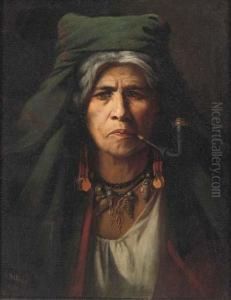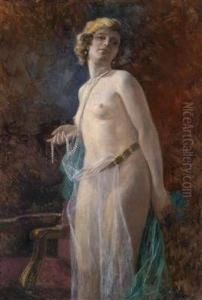Adolf Mullner Paintings
Adolf Müllner was a German dramatist and critic, born on January 18, 1774, in Langendorf near Weißenfels, which is now part of Saxony-Anhalt, Germany. He was not primarily known for his visual arts but rather for his literary work during the German Romantic period. Müllner's contributions to the German theatre were significant, particularly in shaping the 'fate tragedies' or 'Schicksalsdramen' genre that was popular in the early 19th century.
Müllner studied law at the University of Leipzig and then practiced as an advocate. His career as a writer began with satirical works, and later he established himself as a significant playwright with the publication of 'Die Schuld' in 1813. This play, whose title translates to 'The Guilt,' was a landmark in the genre of fate tragedy. He followed this success with another tragedy, 'Der neunundzwanzigste Februar' ('The Twenty-Ninth of February') in 1812, and 'Die Albaneserin' ('The Albanian Woman') in 1820. His works were characterized by a strong sense of fatalism and often dealt with themes of guilt, retribution, and predestination.
Despite the initial popularity of his plays, Müllner's style eventually fell out of favor as tastes in drama shifted towards realism and away from the melodramatic elements of fate tragedies. He also worked as an editor and critic and was known for his sharp and often acerbic reviews. His critical works contributed to the literary discussions of his time, though they sometimes overshadowed his creative writing.
Müllner's influence declined significantly after his death on June 11, 1829. While he was a prominent figure in the German literary scene during his lifetime, his works are less read today, and he is often regarded as a minor figure in the context of German literature. Nonetheless, his contributions to the theatrical genre of the time were notable, and his exploration of themes like destiny and human psychology paved the way for later developments in German drama. Müllner's life and work provide insight into the transitional phase of German literature from the Enlightenment to Romanticism and the eventual rise of Realism.

